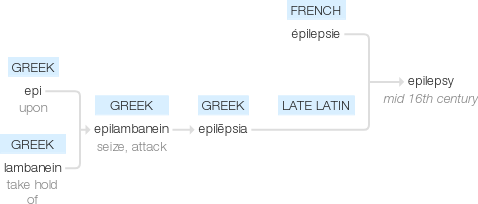Epilepsy
mid 16th century: from French épilepsie, or via late Latin from Greek epilēpsia, from epilambanein ‘seize, attack’, from epi ‘upon’ + lambanein ‘take hold of’.
wiktionary
Since 16th century; borrowed from French épilepsie, from Latin epilēpsia, from Ancient Greek ἐπιληψία(epilēpsía), from ἐπιλαμβάνω(epilambánō, “I seize”), from ἐπί(epí, “upon”) + λαμβάνω(lambánō, “I take”). Displaced native Old English fiellesēocnes(literally “falling sickness”).
etymonline
epilepsy (n.)
1570s, from French epilepsie (16c.), from Late Latin epilepsia, from Greek epilepsis "epilepsy," literally "a seizure," from epilambanein "to lay hold of, seize upon, attack," especially of diseases, but also of events, armies, etc., from epi "upon" (see epi-) + lepsis "seizure," from leps-, future stem of lambanein "take hold of, grasp" (see lemma).
Earlier was epilencie (late 14c.), from French epilence, a variant form influenced by pestilence. The native name in English was falling sickness (Old English fylleseoc, glossing epilepsia).
